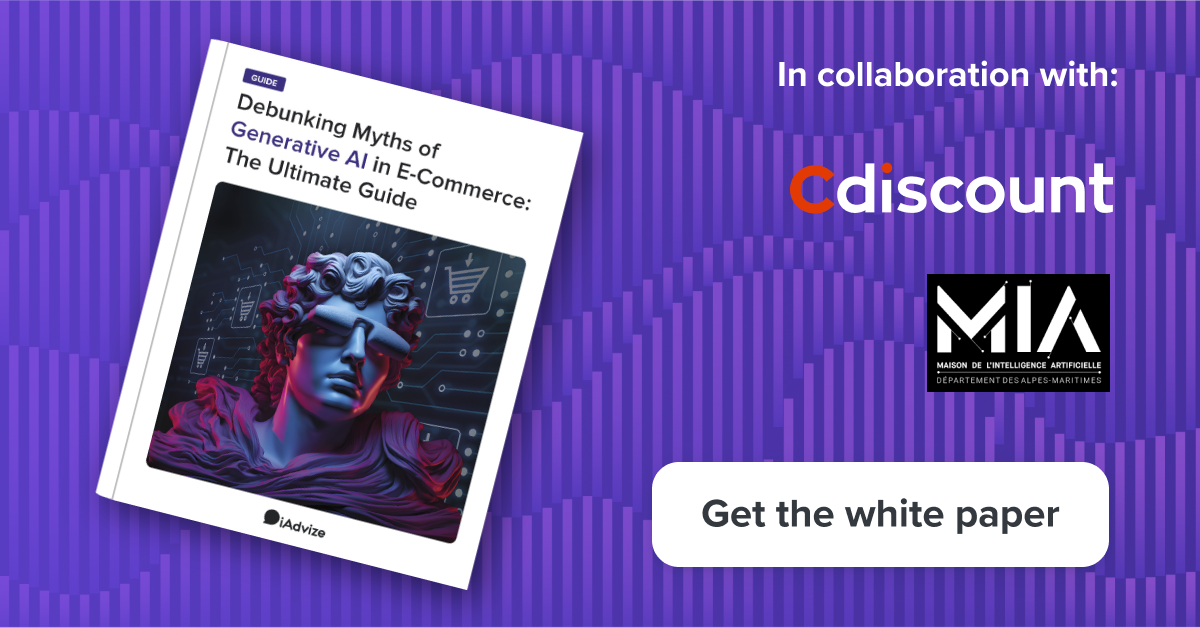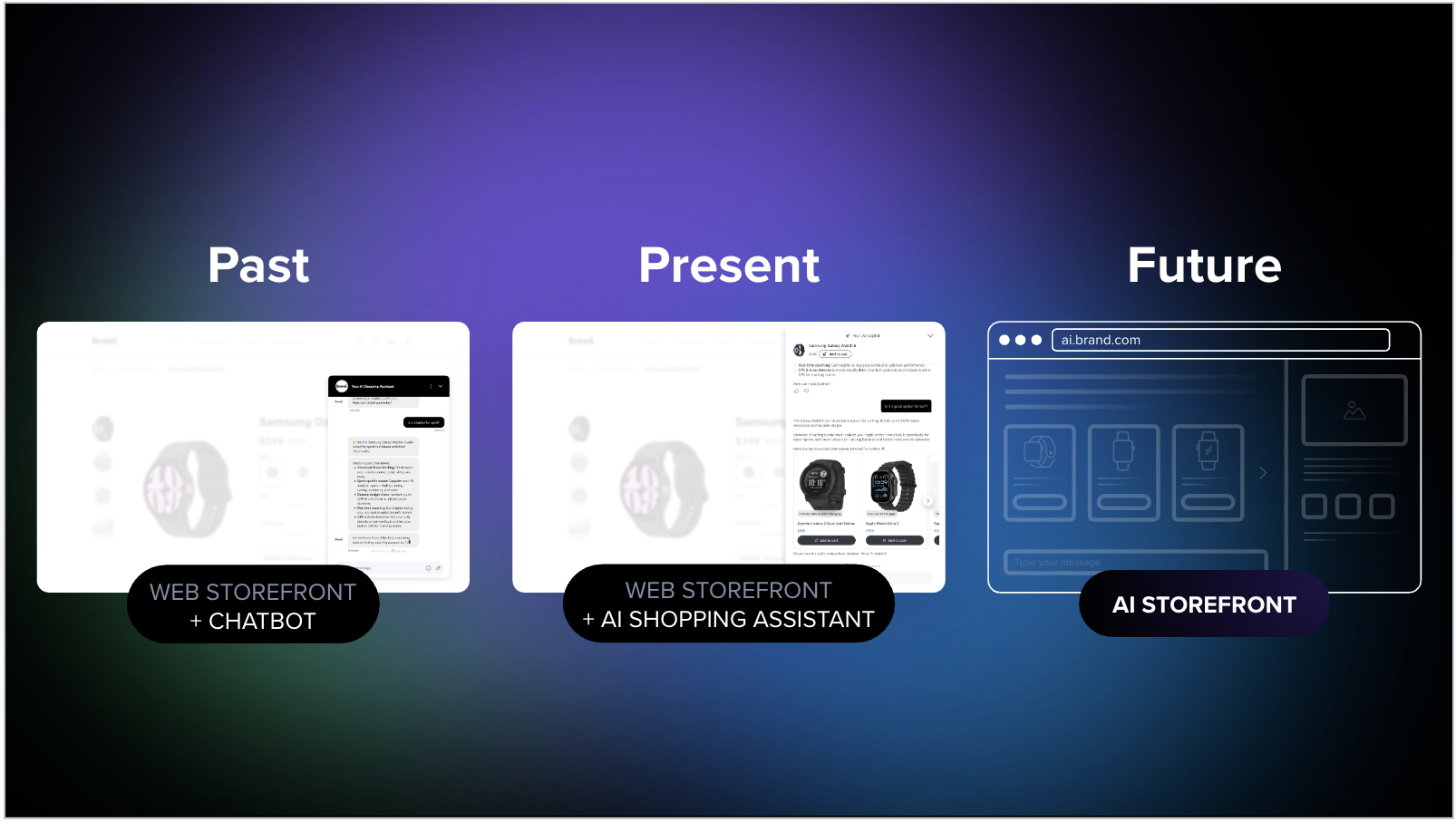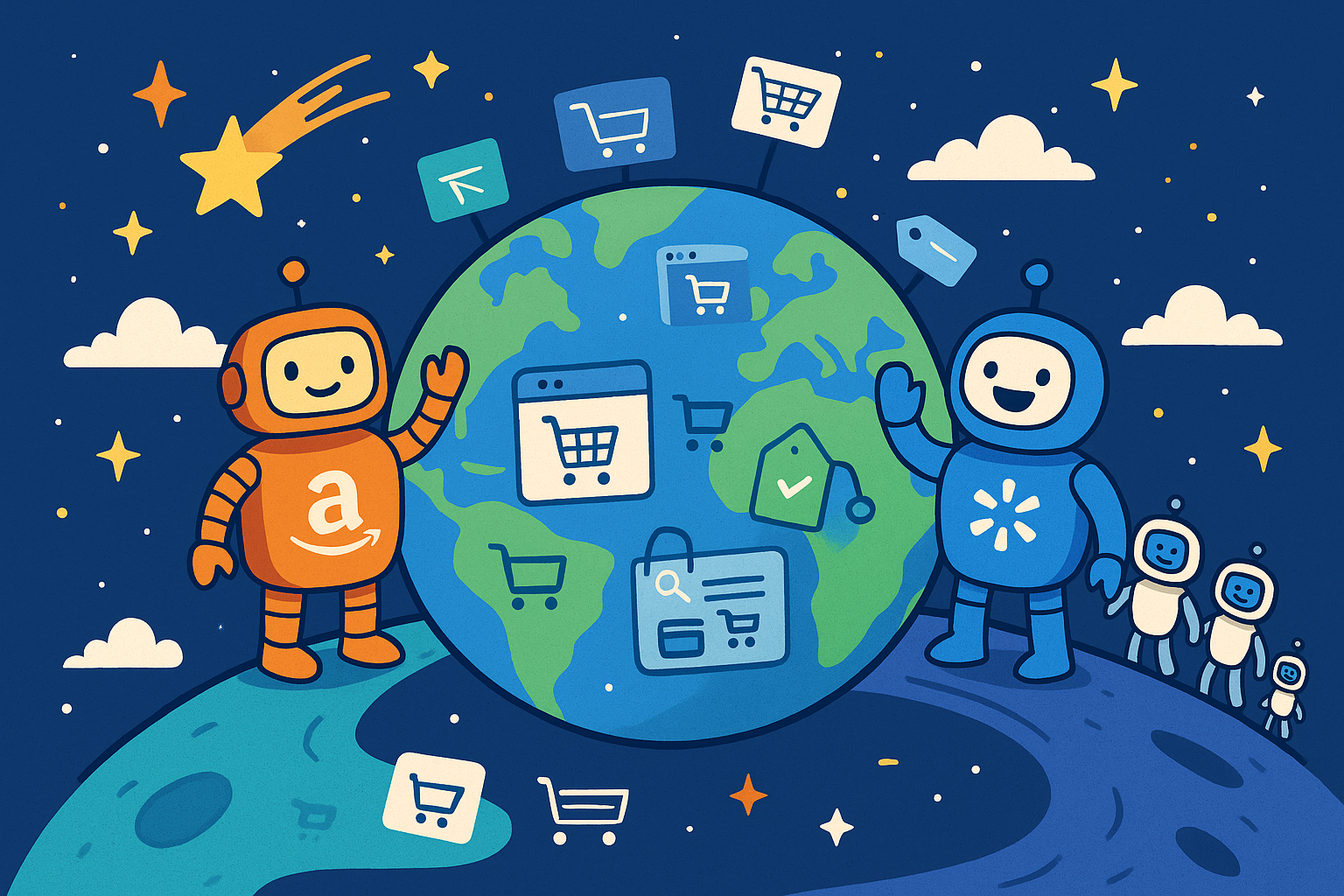What Generative AI Changes About the E-commerce Customer Experience
Julia Lackey

Gartner forecasts that within the next three years, 80% of companies worldwide will have implemented generative AI APIs. We’ll revisit it in 2026 to check the accuracy of this projection, but at iAdvize, the surge in innovation around artificial intelligence over the past year makes this prediction unsurprising. Numerous e-commerce businesses are already embracing this trend, motivated by the widespread success of ChatGPT. For shoppers, generative AI tools are increasingly influencing their online user experiences. Read on to discover factors for how this technology will transform their interactions with brands going forward.
What Is Generative AI?
This is a type of artificial intelligence that specializes in content creation in the form of text, code, images, and music. It's an approach that falls under the branch of deep learning, which is itself a subset of artificial intelligence. Feeling a bit lost? Don't worry, here are some explanations to help you understand it better:
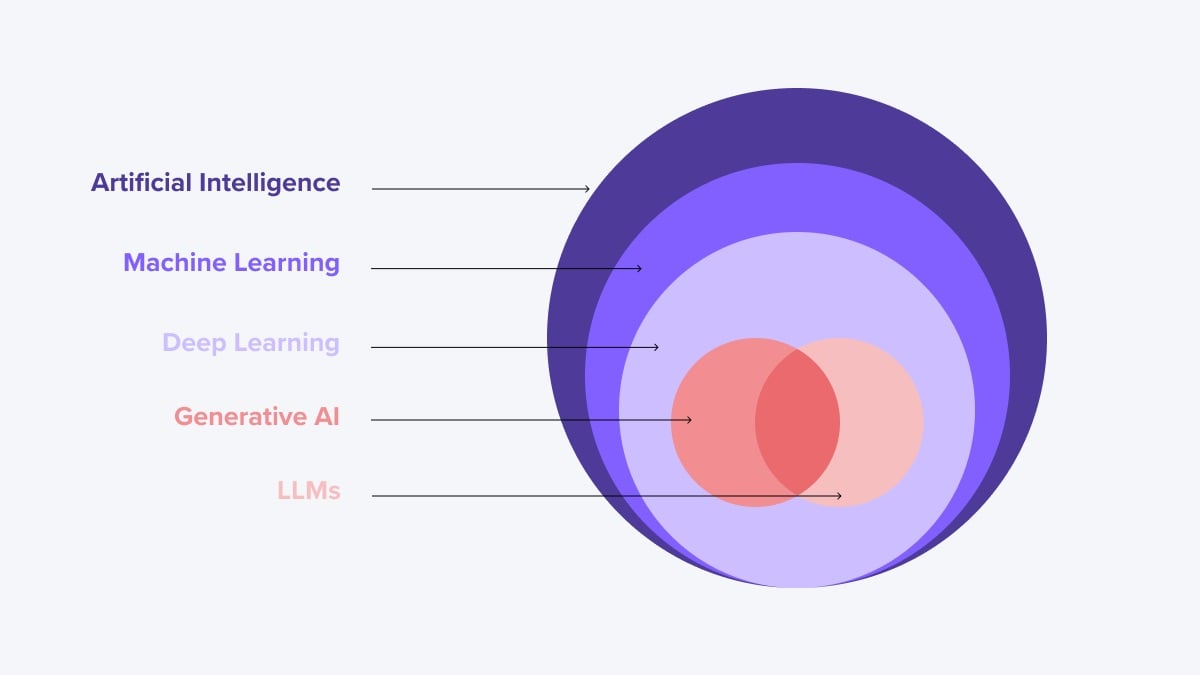
- Artificial Intelligence: This is a field of computer science that aims to create machines capable of performing tasks in a way that would normally require human intelligence or involve data at a scale beyond what humans can analyze.
- Machine Learning: This is a sub-discipline of AI focusing on developing algorithms and statistical models that enable computers to perform tasks without being explicitly programmed for each specific case. It relies on data analysis and automating decision-making.
- Deep Learning: Deep learning is a specific branch of machine learning that uses deep artificial neural networks. These networks consist of multiple layers of nodes, or neurons, mimicking the structure of the human brain, allowing the model to learn highly complex and abstract concepts.
- Generative AI: This is a type of artificial intelligence that can generate new content, such as texts, images, music, or code. It learns from existing datasets to produce original creations.
- LLMs: Large language models (LLMs) are types of AI models that specialize in understanding and generating natural language. They can be used for various applications, such as translation, text writing, understanding natural language queries, and more. These models often rely on neural networks and can work with vast amounts of data, enabling them to perform highly complex tasks.
The Evolution of Artificial Intelligence
AI’s origins can be traced back to the 20th century. For deeper insight into its development and beyond, explore our white paper "Debunking Myths of Generative AI in E-commerce: The Ultimate Guide.”
AI has evolved at a rapid pace. It’s progressed from initial models that could generate simple texts to more sophisticated systems like GPT-3 and DALL-E, capable of creating impressively realistic images and messages. This significant advancement in AI solutions unlocks new potential for retailers in their interactions with consumers and promises to bring substantial implications for online shoppers.
The Impact of Generative AI on the Customer Experience
Hyper-Personalization in E-commerce
Retailers have long grappled with the issue of bridging the gap between them and their customers in their online store user experience. The key question is how to recreate a personalized connection, or even evoke emotion, in a digital environment inherently devoid of human presence—will it ever be possible to replicate the in-store shopping experience online?
For marketers and e-commerce teams, the answer is unequivocally rooted in conversation. It's through dialogue that individual and tailored exchanges occur, forming the cornerstone of the final purchase decision. Yet, the challenge lies in scaling these conversations without raising costs.
Conversational AI has emerged as one of the groundbreaking solutions to this, a type of generative AI that's capable of responding in natural language to customers. This innovation heralds a new age in conversational commerce, offering unparalleled engagement and personalization.
In interactions with an AI chatbot, it can now understand the nuances of a request. In contrast to earlier generations that failed unless specific, pre-trained terms were used, these advanced chatbots comprehend and adjust to varying language levels, respond in any language, and even accommodate spelling or syntactical errors.
Now, AI-enhanced bots extend beyond answering a spectrum of product-related questions or managing recurring requests akin to a dynamic, personalized FAQ. They can also recommend products tailored to the unique needs and preferences of consumers. This represents a pivotal shift in the customer experience strategy for e-commerce businesses.
AI-Based Chatbots With Efficient 24/7 Assistance
Insights from a consumer perception survey we conducted with Ipsos showed that 50% of online shopping cart abandonments are linked to a lack of readily available product information. During their e-commerce journey, shoppers frequently encounter generic product pages and a lack of direct assistance when they have questions. Although customer service is available during regular working hours, many customers are active in the evenings or on weekends. Notably, 34% of American consumers cite the ability to shop 24/7 as one of their top three reasons for preferring an online store over a physical one.
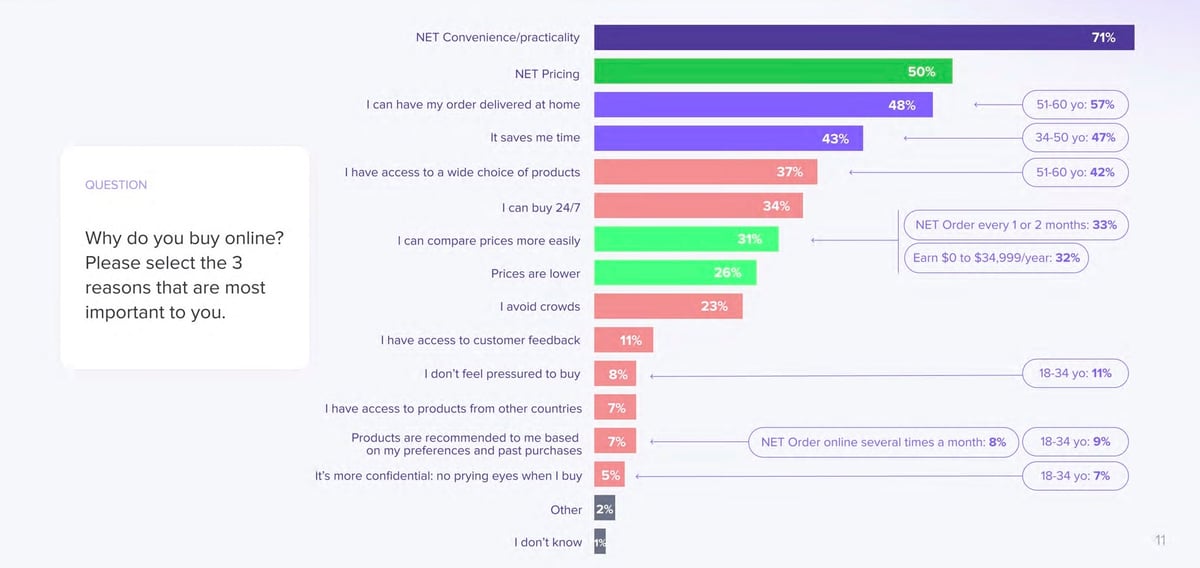
Being available at all times presents a significant challenge. In the past, businesses addressed this gap in customer service by deploying natural language understanding (NLU) chatbots. While effective for addressing common requests, these tools fell short in delivering accurate and tailored responses. In contrast, the virtual assistants of today offer significantly improved capabilities. They seamlessly provide round-the-clock assistance to website visitors, acting as a personal 'copilot' throughout the entire online shopping experience.
Advantages & Challenges
The Benefits of AI Chatbots for Consumers
For US online shoppers, AI’s value is multifaceted.
- 74% agree that they want it to help them get detailed information on the products they’re interested in. The need for pre-sales advice remains a critical point in the customer experience, one that brands must address to better satisfy their customers and gain an advantage over their competitors.
- 65% are interested in using AI to get answers to their post-purchase questions.
- 68% are interested in AI recommending items on a site that match their criteria, while 66% want the guidance based on their budget, and 62% want recommendations that take into account their previous research and purchase history.
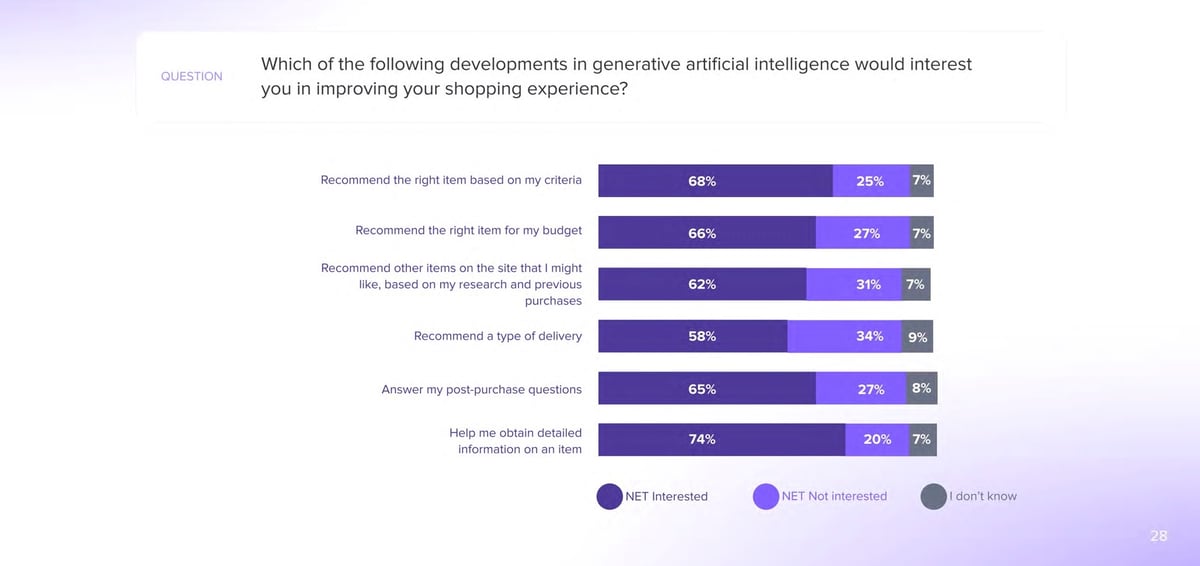
The Challenges of Generative AI for the Customer Experience
Shoppers are both excited and cautious about generative AI tools, a common reaction to disruptive technological innovations. They identify three primary concerns when considering the use of them for assistance during their shopping journey:
- The quality of the responses they might receive
- Concerns about the protection of their personal data
- The reliability of the information provided in the responses
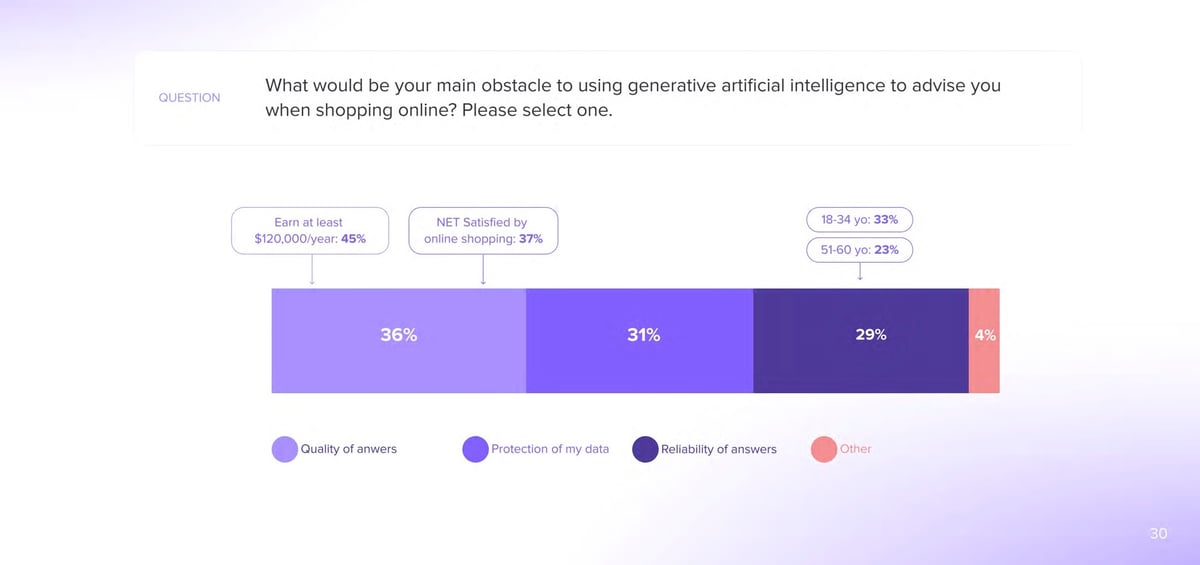
These challenges are well recognized by brands, and converge on a pivotal concept: reliability. Consumers are willing to embrace revolutionary technology, provided they can trust it.
Strategies for Addressing AI Challenges in Customer Service
Consequently, the market demands a conversational commerce platform that can effectively manage these concerns. Brands cannot risk using an interface that fabricates responses or compromises data security, be it the customers' or the company's data. So, what’s the solution?
An AI that:
- Is compliant: It’s compliant with all data laws, like the CCPA and GDPR and internal company policies, and ensures data confidentiality.
- Is connected: It integrates with the company's ecosystem to provide extremely detailed and personalized information based solely on the data provided by the brand, thus avoiding any false or invented responses.
- Is controlled: It utilizes tools that monitor the quality of the conversational experience for both customers and agents, as well as its business impact.
Case Study: How GetFPV Transformed Their E-Commerce User Experience With AI
To better grasp the impact of AI on consumer experiences, let’s explore a real-world example of a Trusted Generative AI chatbot implemented by a brand. What are the effects of this integration on end consumers and the organization?
GetFPV, the leading retailer of first person view (FPV) drones, integrated this technology into its conversational strategy in September 2023. The brand launched an iAdvize Copilot™ to handle all the frequently asked questions on their website—both pre- and post-sales—like payment options, promotional offers, and detailed product questions. This in turn increased conversions on their site.
For their website visitors, they no longer need to search for information across multiple product pages. Now, they can ask questions to a virtual assistant right on the page and receive an immediate response at any time.
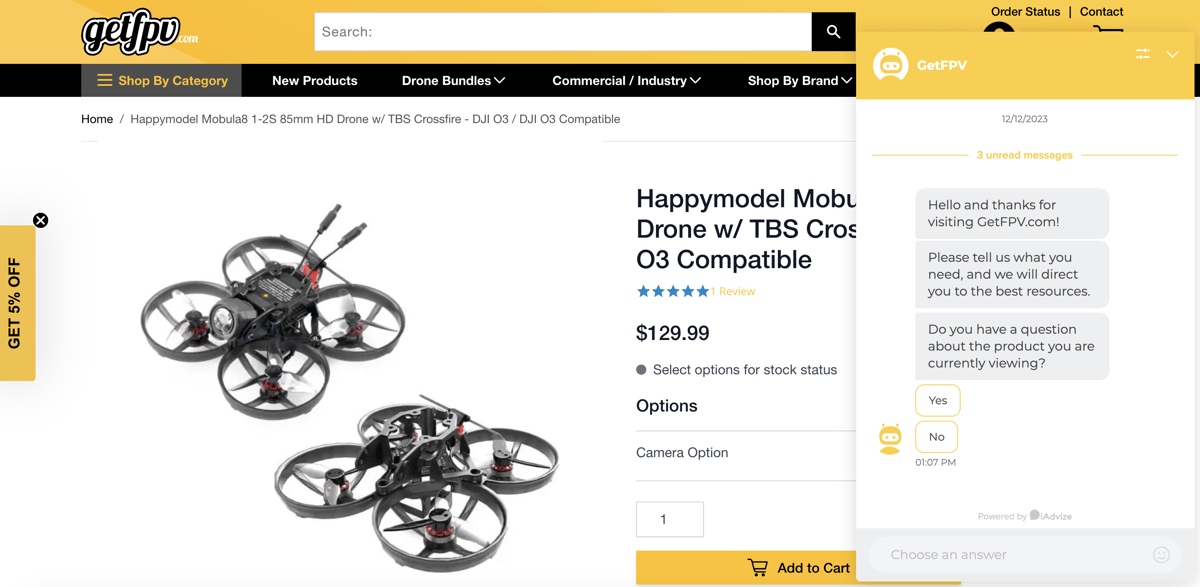
Previously, the brand's e-commerce customer experience strategy relied solely on human interactions through customer service agents or on-demand product experts. AI complements these respondents and overcomes constraints of availability and volume to ensure full coverage for site visitors wishing to engage in a conversation with GetFPV.
"Our experts give amazing answers, but with the addition of a generative AI bot, there's no turning back."
Sean Pontzer, Customer Service Manager at GetFPV
The Future of Generative AI in Consumer Engagement
This technology is revolutionizing the e-commerce sector, signifying a major shift in conversational strategy going forward. We anticipate a profound transformation of websites in the next few years—or even months.
Envision an evolved user experience where current websites gradually give way to conversational interfaces. Here, conversation becomes the primary means of interaction, guiding consumers to products that best fit their needs. AI is poised to become an indispensable Copilot in this new customer journey, tailoring the e-commerce experience to individual questions, desires, and specifications.
Interested in exploring this further? Watch the replay of our webinar with Ipsos’ Managing Director of Customer Experience & Digital, Thierry Lalande, for an in-depth breakdown of the top US generative AI in e-commerce consumer trends we saw emerge in 2023.

.png)
.png)


